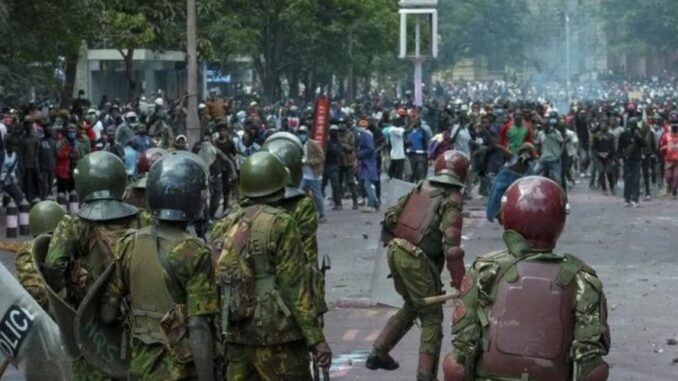
By Revolutionary Socialist League
With the introduction of the 2024 Finance Bill in June, the Kenyan government unveiled new tax measures that sparked demonstrations in Nairobi, the country’s capital. These included a 5% tax hike on money transfers, a 16% tax on formerly tax-exempt bread, financial services, and the transportation of sugar. Small business owners were disproportionately affected by these measures. Since taking office in 2022, with the help of the IMF, President William Ruto has proposed a series of tax increases, the most recent of which are these. Kenya’s most recent demonstrations in recent months has garnered international attention due to the public’s rage and the police’s use of live shot on demonstrators. Some protestors have also been abducted and held incommunicado without any charges, some never to found again.
The deployment of Kenyan police commandos to Haiti last month, despite worldwide outrage, was seen by many startled Kenyans as confirmation that the Ruto administration is willing to be a tool of Western imperialism. The same Western imperialism that has caused the cost of living crises, endless deadly conflicts, and the imposition of harmful fiscal measures in the Global South. Ruto’s May visit to the United States was the first by an African president in fifteen years, and it resulted in ‘concrete rewards’ such as project money and the potential of Kenya becoming a NATO non-ally. This action might be regarded as a deliberate effort by the United States to shore up its fading influence in Kenya and throughout Africa.
Kenya has a long history of imperialism. Indeed, it is a country where ‘capitalism is at home’. Since independence, the Kenyan state has been closely associated with both capitalist and imperialist ambitions. For example, Kenya maintained contacts with South Africa’s apartheid system when other African countries boycotted it. However, numerous histories exist simultaneously. The existence of liberation and resistance efforts has frequently been overlooked and eclipsed by stories of capital. Alternative pathways have been established before, during, and after independence, ranging from the Mau Mau in the 1950s to the Marxist clandestine movement December Twelve Movement-Mwakenya (DTM) in the 1980s.
The crisis of capitalism has reached a crucial point. In Kenya, these issues have resulted in the privatization of public institutions and healthcare systems, which care for a select few at exorbitant fees. Last year, the administration proposed a nearly tripling of tuition costs. If authorized, this taxation of education will alienate and marginalize low-income students. Economic inequities have grown, and the general public has become increasingly depressed and hopeless. Despite its promises, liberalism has failed to deliver tangible answers to widespread poverty. Instead, it has only helped to rehabilitate and sustain capitalism.
The scenario in Europe and America provides a warning note. Liberal democracy has proved itself to be dangerously near to fascism and far-right politics. These far-right groups are now striving to reestablish relationships with African political leaders in order to sustain their influence in a globe that is increasingly threatening their unipolar supremacy. Despite these obstacles, peasant and working-class organizations, socialist movements, and political parties continue their work. Kenyans from all walks of life highlighted the detrimental impact of the new bill on their lives on social media with the hashtag #RejectFinanceBill2024, resulting in a global wave of support. Millions joined the rallies against tax increases that began on June 18, and we were confronted with firearms, water cannons, and tear gas. Thousands were abducted and hundreds arrested illegally. The demonstrations have mostly been spearheaded by teens and adults in their early twenties (sometimes known as Generation Z), who have taken advantage of internet mobilisation to transform it into in-person masses. This generation, once regarded as apolitical, is now the primary force opposing the Ruto administration’s neoliberal policies. Despite unlawful official abductions and other types of oppression, the people’s protest triumphed, and the measure was repealed completely on June 26. The present struggle reflects another side of Kenya’s resistance tale, in which the ordinary people actively oppose and seek solutions to the current economic crisis.
For socialist organizations, there are lessons to learn from the recent uprising to well equip us for the inevitable second wave of the uprising. We can term the recent situation as a pre-revolutionary situation where the ruling class has united against the masses. The recent ‘reconciliation’ between Ruto and opposition leader Raila Odinga, in a attempt to quell the demonstrations, partly succeded as it managed to largely demobilize the masses. However, resistance talks are still ongoing, online and in the streets. There is a paradigm shift in the nature of political talks as they are becoming less tribal and more issue based. Tribe, since independence has been used by the ruling class to divide the masses and the recent protests have caught them of guard leaving them no choice but to unite amongst themselves.
For revolutionary organizations, the paradigm shift has presented an opportunity to recruit young and energetic comrades who are eager to overthrow capitalism. the downside of the recent protests is that due to the intimidation, abduction and death of some of the comrades, some comrades have retreated.
Now more than ever, we need to align with the masses and guide them in the right direction so that when the next opportunity comes, we will be ready.








